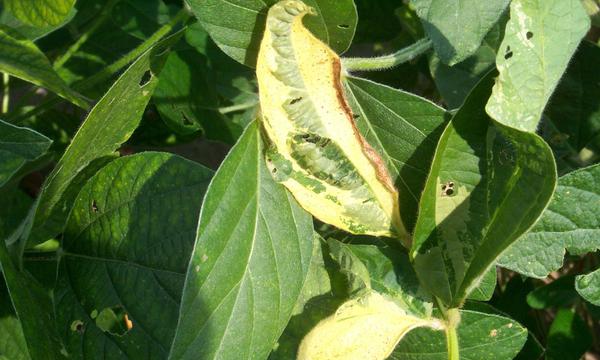Introduction
The cowpea chlorotic mottle virus (CCMV) has been identified in the United States, Cuba, and Nigeria. All strains of CCMV can infect soybean and may cause locally significant yield losses. It is only occasionally observed in North and South Carolina as well as Georgia, and does not cause significant impacts to soybean producers in the region.
Pathogen
Cowpea chlorotic mottle virus (CCMV) is a member of the genus Bromovirus.
Symptoms
Symptoms of infected plants can vary based on the level of cultivar susceptibility. Susceptible cultivars can show severe stunting and mosaic. Leaves may appear distorted with irregular chlorosis. Intermediate cultivars infected with CCMV produce interveinal chlorosis. Infection in resistant cultivars may only develop local lesions. Infected plants may produce fewer seed. Some changes to seed oil and protein composition can occur; however, not usually enough to affect their value.
Disease Cycle
CCMV is sap transmissible and may also be transmitted by certain leaf-feeding beetles depending on the strain of virus. There is no evidence of seed transmission. Once a plant is infected, symptoms of leaf distortion and discoloration may be observed. Bean leaf beetle and cucumber beetle may vector the virus in this area. The virus may infect cowpeas and soybeans, but other legumes may allow the virus to overwinter.
Management
Management for this virus is typically unnecessary in North Carolina soybeans. While some leaf-feeding beetles are capable of transmitting CCMV, they do so with low efficiency and do not typically pose a large threat of spreading this virus within a field. Insecticides to manage the vector are not recommended.
Useful Resources
The NC State University Plant Disease and Insect Clinic provides diagnostics and control recommendations.
The NC State Extension Plant Pathology portal provides information on crop disease management.
The North Carolina Agricultural Chemicals Manual provides pesticide information for common diseases of North Carolina. The manual recommendations do not replace those described on the pesticide label, and the label must be followed.
Acknowledgments
This factsheet was prepared by the NC State University Field Crops and Tobacco Pathology Lab in 2020.
- Check out our Facebook and our Twitter!
Publication date: Sept. 10, 2020
N.C. Cooperative Extension prohibits discrimination and harassment regardless of age, color, disability, family and marital status, gender identity, national origin, political beliefs, race, religion, sex (including pregnancy), sexual orientation and veteran status.
NC Cooperative Extension prohíbe la discriminación por raza, color, nacionalidad, edad, sexo (incluyendo el embarazo), discapacidad, religión, orientación sexual, identidad de género, información genética, afiliación política, y estatus de veteran.
The use of brand names in this publication does not imply endorsement by NC State University or N.C. A&T State University of the products or services named nor discrimination against similar products or services not mentioned.
Recommendations for the use of agricultural chemicals are included in this publication as a convenience to the reader. The use of brand names and any mention or listing of commercial products or services in this publication does not imply endorsement by NC State University or N.C. A&T State University nor discrimination against similar products or services not mentioned. Individuals who use agricultural chemicals are responsible for ensuring that the intended use complies with current regulations and conforms to the product label. Be sure to obtain current information about usage regulations and examine a current product label before applying any chemical. For assistance, contact your local N.C. Cooperative Extension county center.
N.C. Cooperative Extension prohibits discrimination and harassment regardless of age, color, disability, family and marital status, gender identity, national origin, political beliefs, race, religion, sex (including pregnancy), sexual orientation and veteran status.

